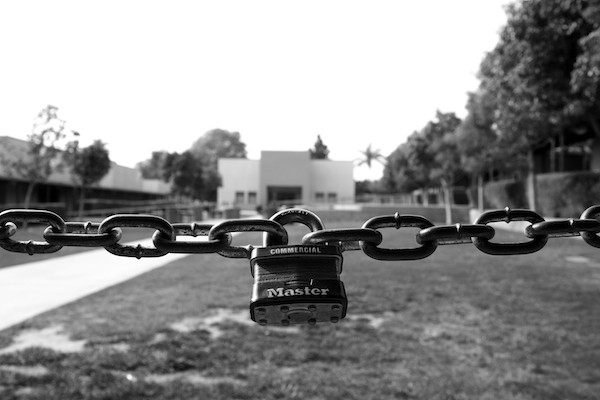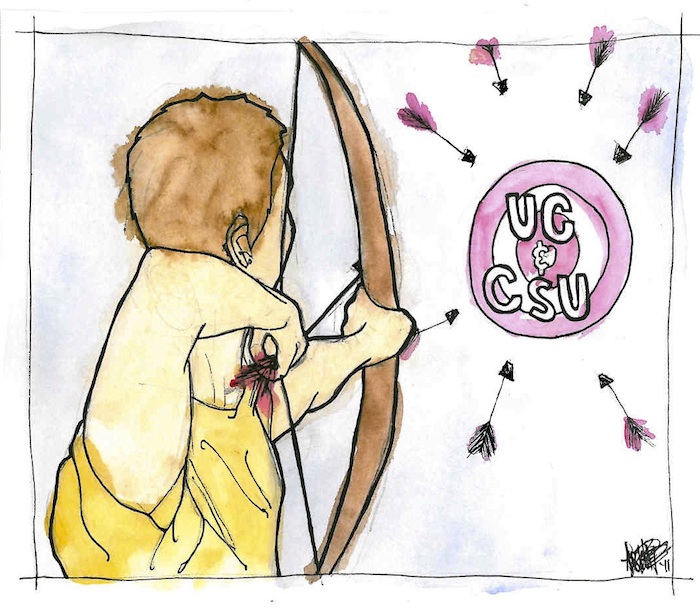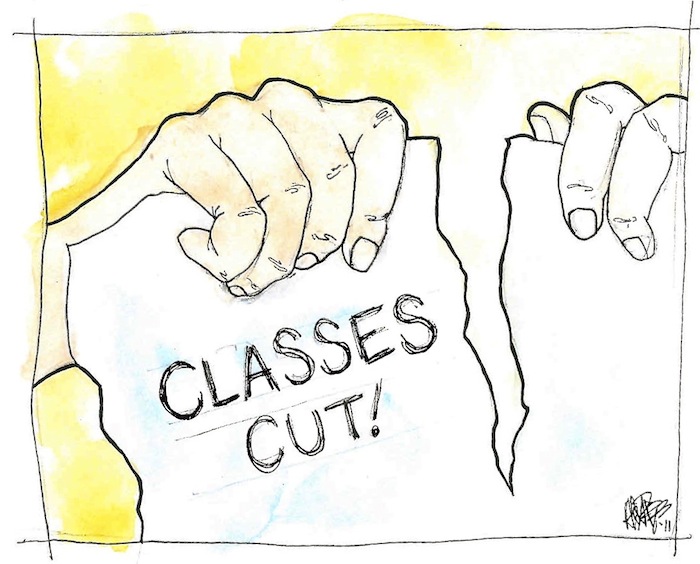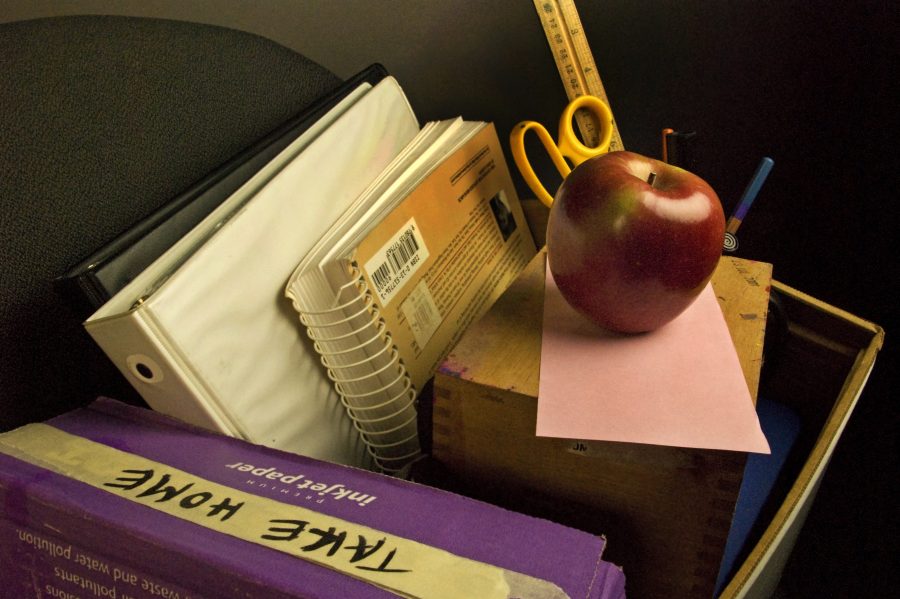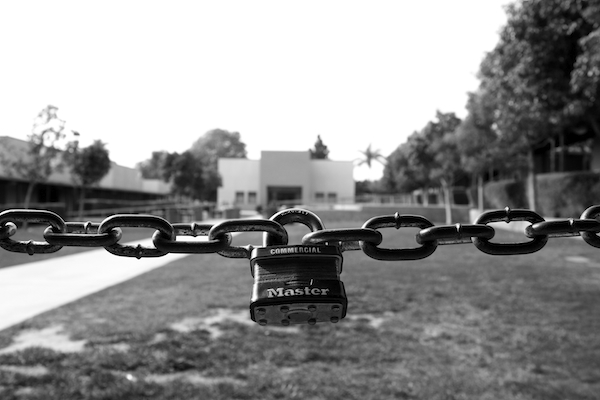
“I want you to be scared.”
Linda Kapala opened an October 12 discussion with this warning about the impending school funding deficit faced by the Ventura Unified School District. Voters will consider an $18 million tax measure on the November 2 ballot that could help the district make ends meet.
Kapala, the media and career specialist at Foothill and site representative of the Ventura Unified Education Association, spoke to teachers at an emergency teacher meeting after school in Foothill’s media center, stating, “It is imperative for us that this measure passes.”
Measure H would tax property owners in the city for four years, at about $8 per month, benefitting Ventura schools, she said.
Kapala went on to discuss ways that teachers could get involved in campaigning for Measure H, the first local school parcel tax measure in more than ten years. Volunteering at evening phone banks, and simply talking to neighbors about the issue were methods that she highlighted.
“In phone banks (targeting likely voters), we’re at 64 to 67 percent yes, 27 percent undecided, and 4 percent no,” Kapala said.
The parcel tax needs a 66.67 percent voter approval in order to pass.
Schools across the state have been struggling financially with steep cuts for the past few years. Ventura Unified, however, has been able to make up budget shortfalls with transfers from its building funds’ budget. But the remaining $5 million in available building funds will be gone by the 2011-2012 school year.
The shortfall projected for next school year is $232,405. The year after that, however, the deficit skyrockets to more than $5.5 million, explained Foothill principal Joe Bova.
If Measure H is passed, the increased revenue could make up $4 million of that deficit, leaving the district at finding ways to cut just $1.5 million.
“The only way to make up this kind of money is in furlough days or major cuts,” Bova said. These alternatives will be what the district turns to if the measure is not passed, he added.
However, some voters argue that taxpayers have already paid enough taxes, and that the government needs to better allocate the funds it already has.
“It is the distribution process that is the problem,” explained Matt Carobini, who graduated from Foothill in June. “The proper distribution of the money needs to be determined between the local officials and Sacramento.”
Carobini plans not to support Measure H, stating, “The local officials need to go to Sacramento and tell them to give us our money back. We have already paid this tax but the state took the money away.”
John Swan, senior vice president of strategic development at a privately held managed care company in Ventura, argues that because the district tries to make cuts as far away from the classroom as possible, much of the additional tax dollars will be paid towards administration and insurance instead of the classroom to rebuild the areas that were previously cut.
“We started providing social services we couldn’t afford,” he said of the school district. “The government has to work within the family budget.”
Carobini holds a similar view.
“We need to work with what we have and cut back instead of spending more like hiring more employees to work at the district office,” he said. “Do what any family would do in a crisis like this, cut back.”
Swan said it’s unfair to make one group of the population pay for everyone else.
“Fifteen percent of the population is out of work, and they have no salary to pay taxes with,” he said. “You can’t place that burden on the workforce. Something else has to give.”
Swan noted that if the government continues to raise taxes, the wealthier portion of the population and large companies, the groups that pay the bulk of the tax, will have a higher chance of leaving California for a better cost of living and lower taxes.
“In the private sector, the tax burden overwhelms people, and it’s not fair,” Swan said.
Representatives from the Ventura County Taxpayers Association, which normally offers advice to voters about tax measures, did not return several phone messages from The Foothill Dragon Press.
School board president Debbie Golden believes Measure H funds would be spent wisely in ways that directly affect students, such as avoiding overcrowded classrooms and the loss of school days.
“The district has been a good steward of the money we have received. We make cuts as far away from the classroom as possible,” Golden said.
Ventura Unified superintendent Dr. Trudy Arriaga stated that the schools are in great need of increased revenue. “We have already cut K-8 summer school,” she said, “We are one hundred employees less than two years ago.”
Arriaga wants to use Measure H money to build programs back that the school district has been forced to eliminate. Any more cuts that are made, Arriaga believes, will the impact the students themselves more than any other group.
“All cuts to education mostly impact students, directly or indirectly,” she said, “No matter if we cut transportation, it’s going to hit the students.”
But looking at it from the perspective of a taxpayer, Carobini stated, “We have already paid this tax and they are not using the money properly, which is why we have a budget situation. We need to stop taking more money from the taxpayers and use within our means.”
“These are tough times for everybody,” Swan added. “We need to find relations equitable across the board.”
Steve Boyd, Foothill counselor and VUEA representative, stressed the importance of all Ventura Unified educators working to pass Measure M.
“This is the only way a school system can raise money in the U.S.”


